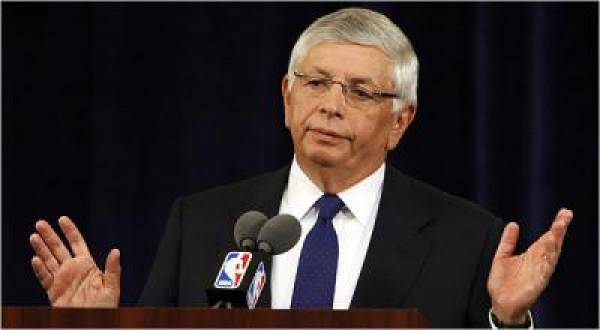What David Stern's Forward Thinking Vegas Approach May Do

By Chad Millman
ESPN Insider
(Original link: http://bit.ly/63jLYG)
It only takes one.
Whenever I'm facing a pivotal life moment that is completely left in someone else's hands, that is the phrase I latch onto. Like when I was asking girls to the prom. Or when I was applying to college. Or when I desperately needed someone to buy my Manhattan apartment so I could actually pay for the house I had agreed to buy.
It only takes one.
Anyway, that was my first thought when I read NBA commissioner David Stern's comments about legalized sports betting in Ian Thomsen's story on SI.com last week. In case you missed it, Stern, while acknowledging that the league's current anti-gambling stance hasn't changed, said, "We have moved to a point where that leap is a possibility."
Seriously, right now, someone send Bernie Madoff down to check Satan's thermostat.
"I have never heard the commissioner of a sport talk about gambling in an open way," says Dave Schwartz, the Director of Gaming Research at UNLV. "Or even be willing to talk about it, or giving more than a one-sentence answer."
Other than European soccer, no professional league has been torched by illegal gambling more in recent years than the NBA, thanks to Tim Donaghy. In the wake of scandal, that the league's boss would acknowledge legalized sports wagering is, perhaps, an acceptable inevitability is astounding. And smart.
Says Schwartz: "It's an acceptance that there is already gambling going on in the NBA, and a policy of prohibition doesn't change that."
I called NBA spokesman Brian McIntyre, and he reiterated Stern's stance, saying: "Our position hasn't changed; we are still against legalized gambling on pro sports." But the way Stern framed his argument was an example of humility from one of sports' most powerful czars. Rather than bending the world to the will of his league, he basically pointed out that the world has changed, and his league could benefit from that.
When he became the NBA's steward in 1984, lotteries (state, not draft) were becoming acceptable, as local governments tried to dig themselves out of a nationwide recession. Before that they had been one of the most socially stigmatized forms of gambling because, experts argued, they preyed on the poor (that hasn't changed, but we all need the dough). Now, beyond lotteries, nearly every state in the country has legalized gaming -- from slots to riverboat casinos. And while sports betting is still perceived by politicos as gaming's most virulent strain, everyday folk feel differently. Broadly, more access to gambling has made people comfortable with the idea of betting. And, specifically, the proliferation of Internet betting sites has made wagering on games feel less illicit than in the days when mob bosses testified about their sports betting gains before Congress and the only options for getting down action were corner bookies.
Stern has been more forward-thinking about his relationship with Vegas than his counterparts in the NFL, NHL and Major League Baseball. The NBA allows Vegas-focused ads, held its All-Star game in Sin City and has no problem with the Kings being owned by the Maloof brothers, who own the Palms Casino. As Stern said on SI.com, "Look, Las Vegas is not evil. Las Vegas is a vacation and destination resort, and they have sports gambling."
But what he was doing is getting ahead of an issue that will become more and more relevant in the coming years, as the federal government and legislators struggle to balance their books. Barney Frank, the Democratic Congressman from Massachusetts, has proposed a law to legalize, regulate and tax Internet gaming; an independent budget analysis group said this would bring in $42 billion. Delaware has already reinstituted betting on NFL games to help close its $800 million budget gap. And a New Jersey state senator, Ray Lesniak, has sued the Department of Justice to overturn the federal sports betting ban, which was passed in 1992 and exempts only Nevada, Delaware, Oregon and Montana because they already had state laws allowing betting on the books.
In five to ten years, the discussion league execs will be having won't be about how to keep states from enacting sports betting legislation; it will be about how to split up the revenue that sports betting generates. Stern cheekily pointed out that this will be an issue for his successor, not something he'll be tackling during his tenure. But what's most interesting was his acknowledgment that it's not just social mores that have changed; it was that economic times have changed even more dramatically. Those are the kinds of circumstances that make it easier for pragmatists like Stern to sit at the table.
Even if he is the only one. So far.













